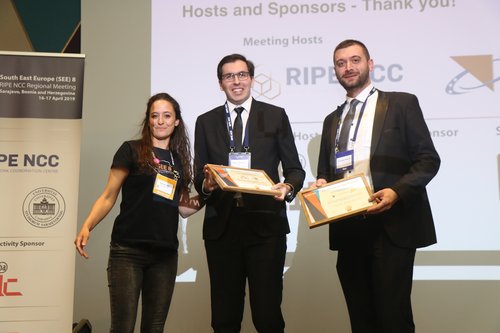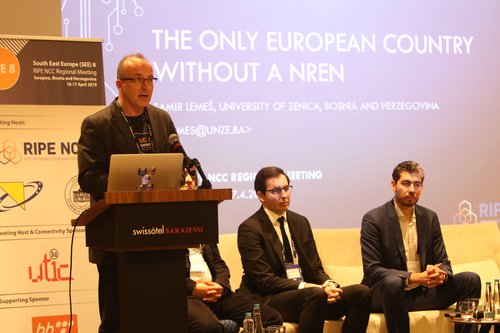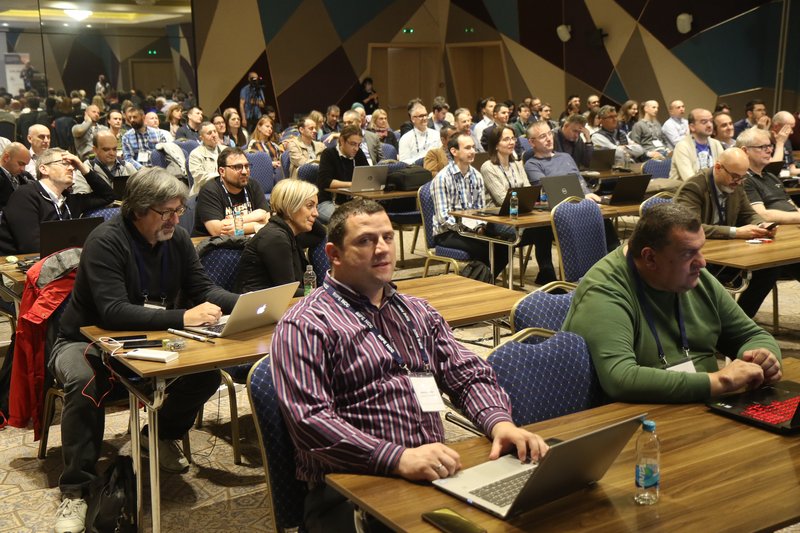You're viewing an archived page. It is no longer being updated.
Meeting Report
The eighth South East Europe/RIPE NCC Regional Meeting (SEE 8) took place from 16-17 April 2019 at the Swissôtel Sarajevo, in Sarajevo, Bosnia and Herzegovina. SEE 8 was attended by 156 people from 19 countries. The meeting was co-hosted by the RIPE NCC with University Tele-informatics Centre (UTIC) and the Communications Regulatory Authority of Bosnia and Herzegovina.
The meeting was opened by Serge Radovcic, Chief Communications Officer of the RIPE NCC, along with Jan Zorz, SEE 8 Programme Committee Chair, and Elmedin Selmanović, Director, University Tele-informatics Center, University of Sarajevo.

Axel Pawlik, Managing Director of the RIPE NCC presented the RIPE NCC Update and Aleksandar Mastilovic, Expert Advisor to the Director General at the Communications Regulatory Agency (CRA) Bosnia and Herzegovina, gave an overview of the Internet in Bosnia and Herzegovina and provided a statistical analysis in the opening plenary. Here are some of the key topics that were in the spotlight during SEE 8.
IPv4 exhaustion and IPv6
Ingrid Wijte from the RIPE NCC spoke about what they were doing to prepare for IPv4 exhaustion. She encouraged members to request a /22 from the RIPE NCC if they needed IPv4 and had not yet done so. She also reminded members to keep their contact information up to date in light of the increase in address hijacking cases the RIPE NCC had been seeing. Samir Lemes, University of Zenica said that Bosnia and Herzegovina was currently the only country in Europe without an NREN but they hoped to get one soon. He asked if it would be possible to reserve address space for their network until they created a legal entity that could become a member of the RIPE NCC. Ingrid clarified that the RIPE NCC couldn’t reserve addresses for potential members. She recommended they start this process soon if they intended to request IPv4 for their NREN.
Dzenan Gagula of BH Telecom spoke about IPv6 deployment at BH Telecom and Pavle Mijuskovi and Božo Krstajic gave a joint presentation on Montenegro’s national IPv6 transition plan. One of the key takeaways was that it was important to have a strategic plan and in Montenegro the public procurement requirements were being changed to include IPv6. However, it was pointed out that more needs to be done to incentivise operators to make the shift. Jan Žoržadded that in Slovenia, the regulator had required operators to answer a survey which included IPv6, and this helped to raise awareness at the management level.
IXPs and Peering
There was a lot of discussion over Bosnia and Herzegovina’s first IXP (BH-NIX), which was in the process of being set up. David Huberman and Hisham Ibrahim spoke about root server possibilities for Bosnia and Herzegovina. Rebecca Class-Peter recommended that they become a member of Euro-IX and said that BH-NIX was already a part of the IXP-DB, which was a good first step. She also said that established IXPs could offer support to newer IXPs.
Vladislav Bidikov, IXP.mk gave an update on the first IXP in Macedonia and the challenges they faced. He shared that one of the challenges is getting more volunteers involved and setting up a community to support the IXP.
Susan Forney, Hurricane Electric, gave a very informative talk on peering economics which led to an interesting Q&A session on how to negotiate better prices with an IXP, when it makes sense economically to set up a peering connection, and how an IXP could benefit Bosnia and Herzegovina. She added that having direct connections to everyone could be expensive when you add up the port fee, cross-connect fee and transit costs. This is why an IXP was useful, even if you started small.
NREN Panel Discussion
 One of the highlights of SEE 8 was a panel session on setting up an NREN in Bosnia and Herzegovina. The discussion brought together representatives from three different universities within Bosnia and Herzegovina, CARNET (the Croatian NREN) and GEANT. The session shed light on the previous attempts to set up an NREN in the country and the obstacles that were faced. Anastas Mishevoutlined the support that GEANT could provide universities through an NREN, and why this was crucial. The panel agreed that closer cooperation was necessary, and raised the possibility of having a conference dedicated to this topic. The panel also reiterated the need to maintain the pressure to set up an NREN, and hoped to report on more concrete steps in the near future.
One of the highlights of SEE 8 was a panel session on setting up an NREN in Bosnia and Herzegovina. The discussion brought together representatives from three different universities within Bosnia and Herzegovina, CARNET (the Croatian NREN) and GEANT. The session shed light on the previous attempts to set up an NREN in the country and the obstacles that were faced. Anastas Mishevoutlined the support that GEANT could provide universities through an NREN, and why this was crucial. The panel agreed that closer cooperation was necessary, and raised the possibility of having a conference dedicated to this topic. The panel also reiterated the need to maintain the pressure to set up an NREN, and hoped to report on more concrete steps in the near future.
Other Highlights
A talk on root servers by David Huberman from ICANN opened up a discussion on the possible ways to set up a root server in Bosnia and Herzegovina. David pointed out that any operator could request an L-root instance, but this didn’t cater to IXPs. Hisham Ibrahim, RIPE NCC, invited attendees to ask RIPE NCC staff if they wanted to learn more about K-root.
RPKI and routing security grabbed the audience’s attention, with a presentation by Nathalie Trenaman from the RIPE NCC. The audience was curious to know about global interest in RPKI, the recent “RPKI Deployathon” held in Amsterdam, and how to deal with ‘invalids’. RIPE Atlas was another topic of interest, particularly following the RIPE Atlas tutorial that preceded the meeting. Vesna Manojlovic, RIPE NCC, gave two lightning talks, one on measuring the reachability of your server using RIPE Atlas and another on visualising Internet traffic paths, and Samir Lemes, presented on the RIPE Atlas Anchor at the University of Zenica.
